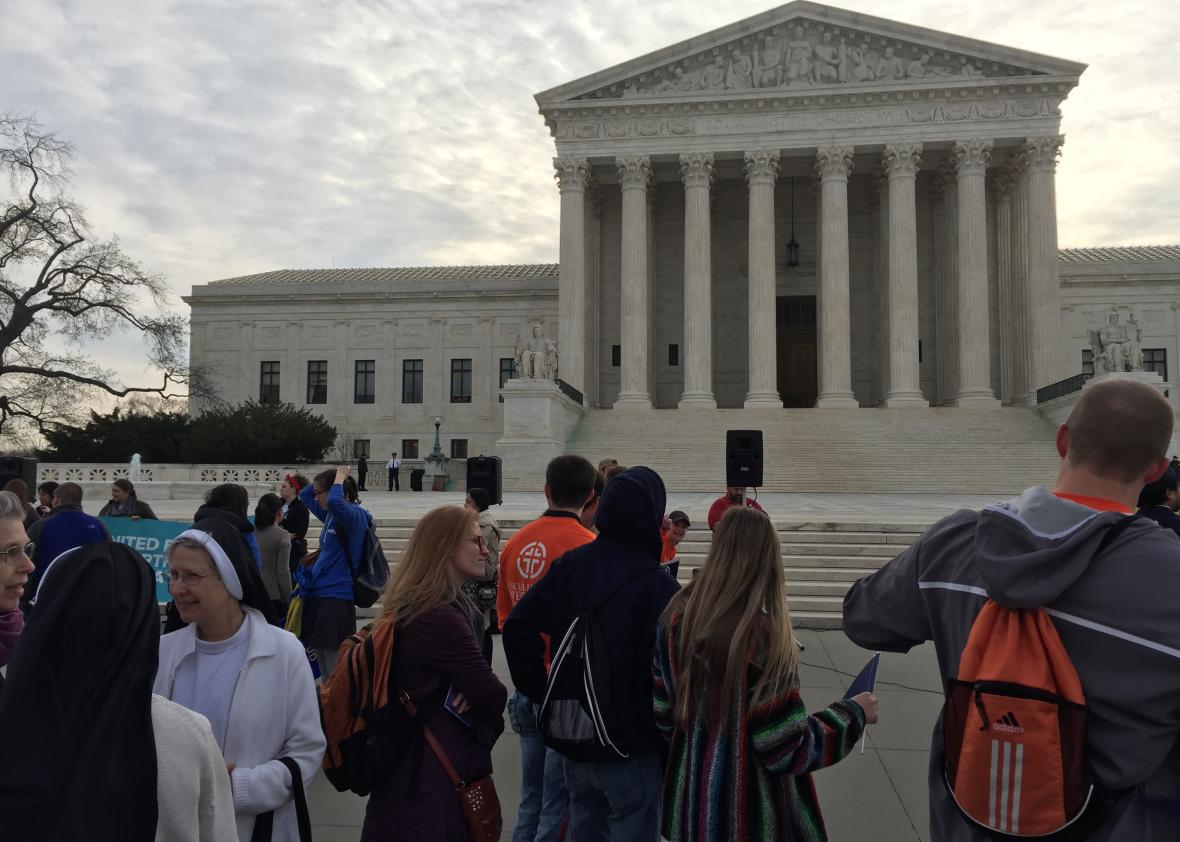Wednesday’s arguments in Zubik v. Burwell, also known as Hobby Lobby 2.0, were like a two-act play in which the central character undergoes a radical transformation during the intermission. Naturally, that character was Supreme Court Justice Anthony Kennedy, whose sharp questions throughout the first half of the arguments were abruptly superseded by a piercing, ideological inquiry later on. That late question seemed to reveal Kennedy’s hostility toward the government’s contraceptive mandate accommodation, the central issue in Zubik—raising the very real possibility that, at least in seven states, the accommodation itself is doomed.
Zubik revolves around the portion of the Affordable Care Act that guarantees women access to FDA-approved contraceptives through their health insurer. Although the mandate applies to religious non-profits (like colleges and hospitals), the government has created an accommodation if those groups object that providing contraception would violate their religious beliefs. These organizations have two options: They can send a simple form to their insurer opting out of contraceptive services, or they can notify the government that they won’t be providing contraception. Once the organization has opted out, the insurer must step in to provide contraceptive services directly to employees through a plan that is wholly separate from the employer’s.
But some religious organizations sued, insisting that even the accommodation violates the Religious Freedom Restoration Act. Under RFRA, any government action that imposes a “substantial burden” on religious exercise must be “the least restrictive means” possible to further a “compelling government interest.” Much of the action in Zubik has revolved around the question of whether the accommodation imposes a substantial burden on religious non-profits—whether signing a short form exempting themselves from the mandate somehow restricts their free exercise of religion. The government says it does not, because once the organizations sign the form, they are totally removed from the contraception equation. Religious non-profits disagree, asserting that, by signing the form, they are authorizing coverage for their employees to which they object.
Initially, Kennedy—still the swing-vote on this now eight-member court—seemed to lean toward the government’s argument. That makes sense, since Kennedy’s concurring opinion in Hobby Lobby, which exempted for-profit corporations from the contraceptive mandate, seemed to bless this very kind of accommodation scheme. Arguing for the religious groups, Noel Francisco claimed that his clients should get the same accommodation that actual churches received: to be completely exempted from the contraceptive mandate. He then took things a step further, implying that religious non-profits should generally get the same special legal treatment as houses of worship. Kennedy interjected, asking whether this meant religious colleges must be treated, under the law, like real churches. Francisco said yes, and Kennedy seemed deeply concerned that religious schools could deprive their students of contraception through their own health insurance.
Yet Kennedy quickly changed his tune when Solicitor General Donald Verrilli approached the bench to argue that the accommodation sufficiently removed religious employers from taking part in offering contraceptive coverage. First, the other conservative justices pounced, proclaiming that the accommodation will allow the government to “hijack” religious groups’ health plans and provide coverage against their will. This “hijacking” thesis is incorrect, or at least wildly misleading; in reality, once an organization takes the accommodation, the government provides the contraception coverage to employees through a separate, distinct plan. But if the court buys the “hijacking” concept, it’s likely game over for the accommodation. Hijacking a health insurance plan to force employers to provide contraception is surely a substantial burden, and certainly not a narrowly tailored one.
That’s why most heads in the courtroom snapped up when Kennedy uncritically used the hijacking language himself. Verrilli was attempting to explain why the government set up the accommodation the way it did when Kennedy interrupted.
“That’s why it’s necessary,” he said sternly, “to hijack the plans?”
It was less of a question than a statement—and, as such, a profoundly troubling one for the government. If Kennedy believes the hijacking argument, then he thinks religious non-profits are really being forced to participate, even tangentially, in contraceptive coverage. And if Kennedy thinks that, then he’ll vote to invalidate the mandate. On the current court, that would mean the case would likely be deadlocked at 4-4, maintaining the mandate in most of the country—the parts where circuit courts upheld the mandate—and getting rid of it in some of the rest. (A tie would preserve the Eighth Circuit’s ruling against the mandate, invalidating it in seven states.) For contraceptive advocates, that outcome is better than a 5-4 loss. But it will ensure that, in some parts of America, employers can still effectively deny their employees access to basic reproductive health care.
